Applying for Registration with CORU
Well done on making it this far! You’ve reached the final hurdle in this process. Fortunately this bit is a lot less involved than the Recognition process, but UNfortunately it will feel very repetitive. Prepare yourself for the utter inefficiency of providing a lot of the same information for the second time…
My first tip before commencing this step is to head to the CORU website, follow the links to the “Apply for Registration” page and have a thorough read of the Guidance Notes. As much as I try my best to help you, this is where you will find all the most up to date information on the process.
Based on the fact that you’re reading this page let’s assume you’re applying under Section 38, that is you’re commencing practice of your profession in Ireland (rather than someone who is already practicing in Ireland and applying under Section 91). You’ll go through a few stages, and here is how I recommend you tackle each of them:
1. Read the Guidance Notes
It’s important to check that you meet all the eligibility criteria and will be able to provide all the information they are asking for before you invest your time, money and energy into this process.
2. Gather all the necessary documents
The main reason being that you have a deadline of 30 days from submission of your application to provide all the the required supporting documents. If you’re trying to arrange a police check or a Notary Public to provide certified copies last minute then you’ll place yourself under unnecessary pressure. You’ll get a check list of everything you need to provide, but just so you’ve got it all in advance here’s a rundown:
- Statutory Declaration: downloaded from the CORU website, witnessed and signed by the right person
(* I’ll interrupt things here for quick Public Service Announcement on Certified Copies: Please ensure you get the appropriate person to certify your documents. CORU will reject your application if it isn’t signed by a Practicing Solicitor/Notary Public/Commissioner for Oaths/Peace Commissioner with all the right details. A Justice of the Peace, for example, is not adequate for this process, nor is a police officer.)
- eVetting Invitation Form: basically a criminal history/working with children check
- Proof of address document for the eVetting form (e.g. utility bill or bank statement) – no need to certify this
- Certified copy of your proof of identity document (current Passport or Irish Driver’s Licence) for the eVetting Form
- Certified copy of your proof of identity document (current Passport or Irish Driver’s Licence) for the online CORU application
- Certified copy of evidence of change of name (if applicable)
- Certified copy of your Qualification/University Certificate
- Your CORU Recognition Letter
- Certified copies of Criminal History Checks for EVERY country you have lived in for more than 1 year since the age of 18
- 2 passport photos with name and date on the back
- Proof of English Language Competency: evidence may be in the form of a letter or note on your University Transcript stating that your qualification was completed in English, or a letter from an employer stating that you have practiced in an English speaking country for at least 2 years or a language proficiency test
In usual times all of these documents would be posted to CORU, but I was required to provide them electronically via email due to office closures during COVID. This meant for example I sent one electronic copy of a passport photo. Please just be guided by your Registration Officer when you apply.
3. Start the Online Application
Now that you’re somewhat prepared (who knows if they’ll throw you any other curve balls!), head to the CORU website and follow the links to Apply for Registration. Select your profession, enter your email address, and your login details will be emailed to you to create your online account:
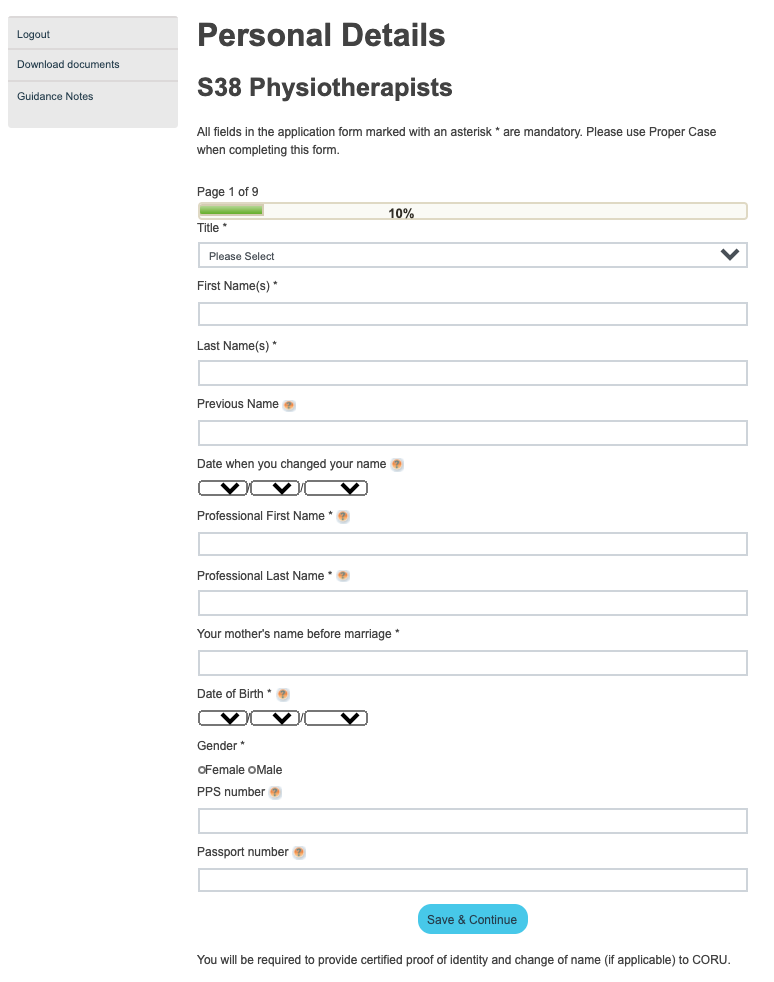
Page 1
Nice and easy to begin with.
If you don’t have a PPS number don’t worry, just leave it blank. I didn’t have one either and it wasn’t an issue.
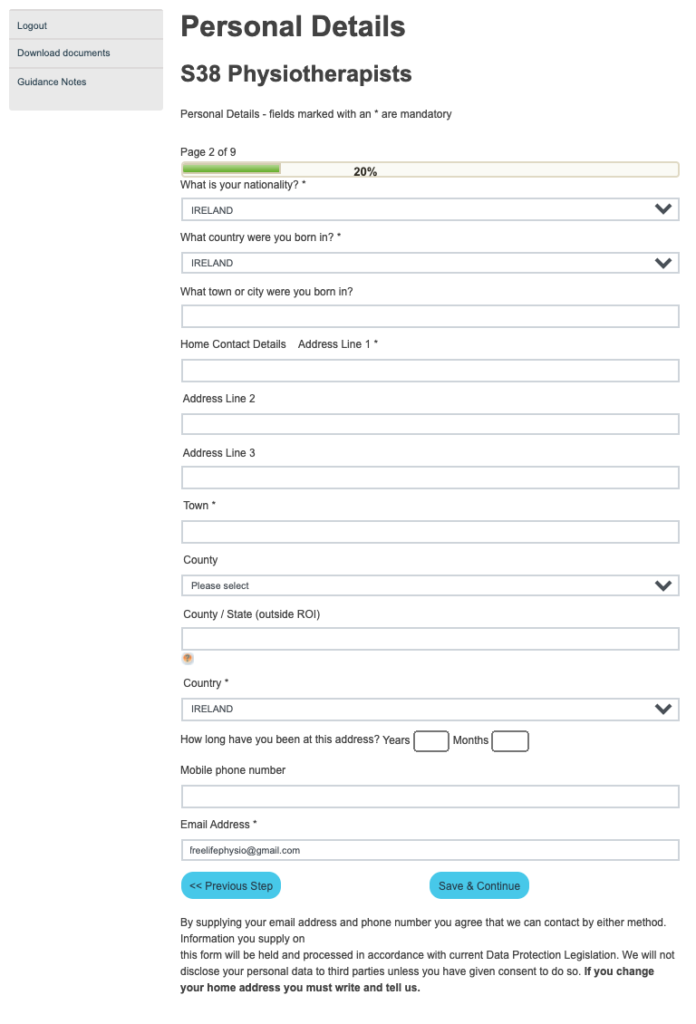
Page 2
Again pretty simple.
Bear in mind you need to provide a proof of address document for your eVetting form so keep things consistent.
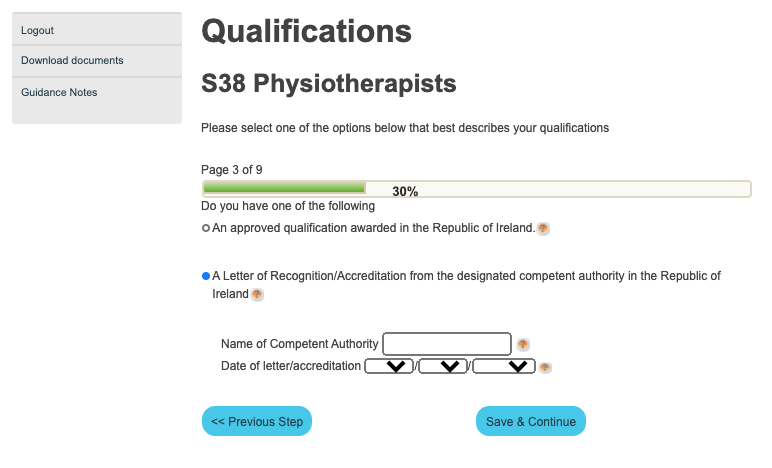
Page 3
All you need to go here is tick the Letter of Recognition box.
The name of the Competent Authority is CORU and you need to provide the date on your Letter of Recognition.
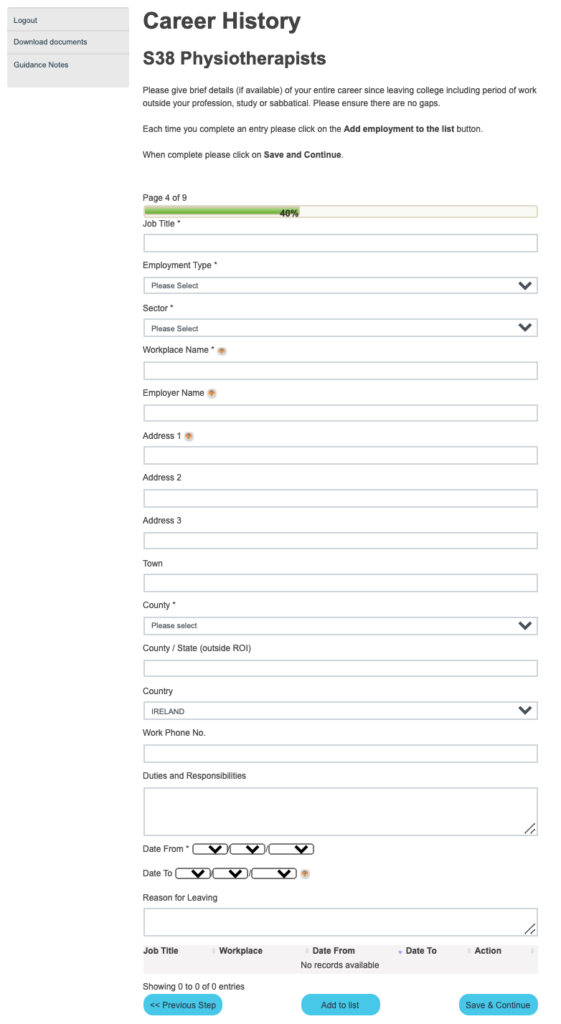
Page 4
Depending on the length of your career and how many different jobs you’ve had to date this might be the bit that takes the longest.
Top tip: you’ve already supplied all of this information on your Recognition form. Save yourself from reinventing the wheel by copying and pasting the details straight in!
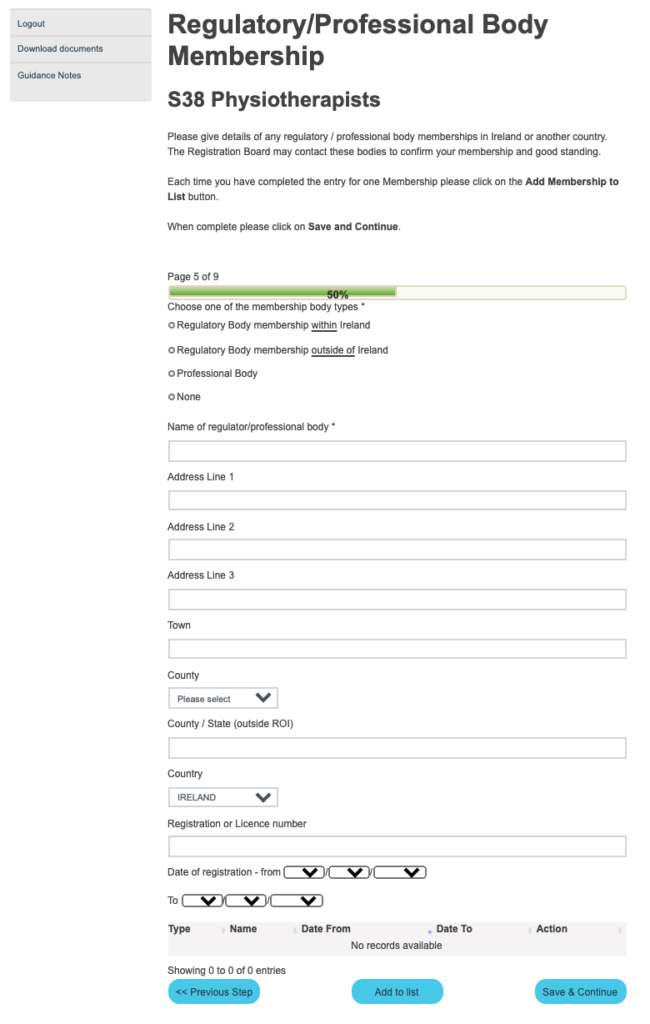
Page 5
Regulatory bodies refer to your National Organisation: the Australian Physiotherapy Association, the New Zealand Physiotherapy Board, HCPC etc.
Professional bodies refer to any other organisations you are a member of: National Hand Therapy Associations, Sports Groups, Acupuncture Special Interest Groups etc.
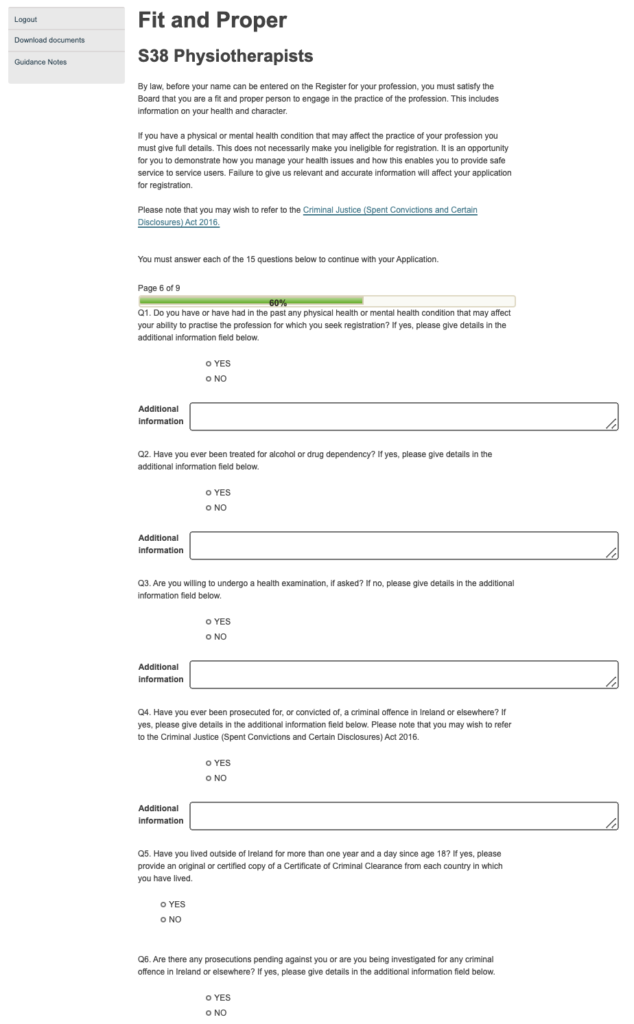
Page 6
I can’t tell you what to do with this section, so I’ll leave it to you and your individual circumstances.
The Guidance Notes do say that answering yes to any of these questions will not preclude you from becoming registered, so please just be honest.
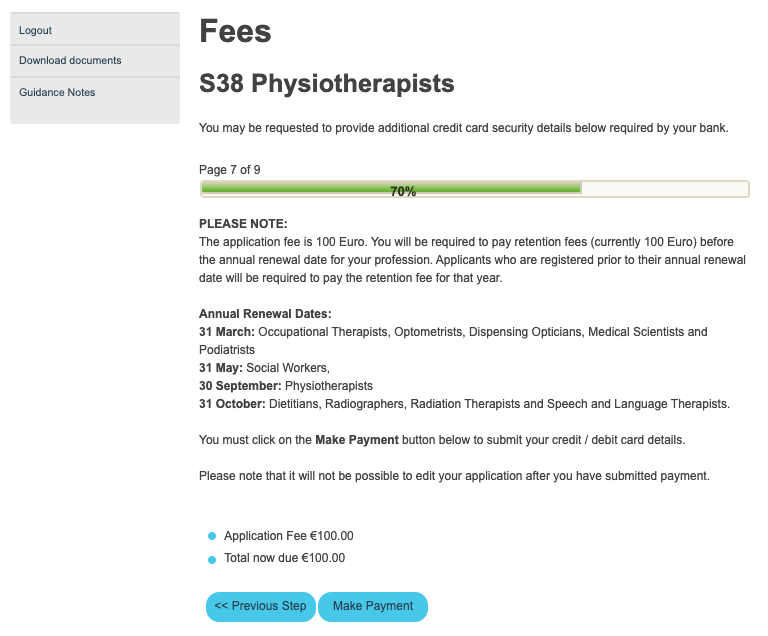
Page 7
Now is a good chance to go back and check on your answers!
Be aware that this application fee will also cover your registration for the rest of the professional year. Check the dates here to try and time your application – as a physio it would be a bit of a bummer to fork out €100 on 29th September just to have to pay another €100 on the 30th!
After your payment is processed you’ll be provided with a summary of the details you provided, and an ‘Application Cover Page’. This is your itemised checklist outlining the next steps you need to take and the documents you need to provide to CORU in the next 30 days – if you’re late then you just wasted €100 and a whole lot of time!
4. Print and fill out all your forms
Now is the time to fill out your eVetting Form and Statutory Declaration.
5. Send everything off to CORU
During COVID this may be via email, in normal times pop it in an envelope to Dublin.
6. Complete the eVetting process
After your application is submitted you’ll receive an email from The National Vetting Bureau to complete the online section of the vetting process.
All you have to do is click on the link and follow the steps. Expect to provide details like your passport details, all the names you’ve ever been officially known by, and all the addresses you’ve lived at since birth (THIS was a tedious one…).
Based on your criminal record this may take anywhere from 1 week to 4 months!
7. Await the outcome
Once your file is complete and it’s passed all of CORU’s final checks, you’ll just have to sit tight and wait it out. For me it was 4 weeks between submitting everything and getting the email to say I had been successful and added to the register! What a happy day that was…
And so my friends we have reached the end. The next part of the adventure is up to you – get yourself on that Aer Lingus flight and into the pub for an Irish jig and a pint of Guinness to celebrate!
